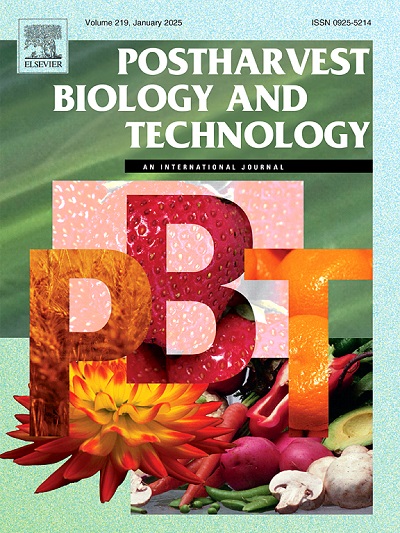Insights into stress response pathways and potential triterpene accumulation mechanisms induced by friction damage in kiwifruit
IF 6.8
1区 农林科学
Q1 AGRONOMY
引用次数: 0
Abstract
Kiwifruit suffers significant commercial loss due to friction damage. This study investigated the quality, physiological, transcriptional, and metabolic responses of kiwifruit to friction damage during storage at 25 ± 2°C. The notable changes in friction-damaged kiwifruit involved flesh browning, rapid softening, mold development, and an increase in total triterpene content. Compared to the control group, 1328, 3429, and 6347 genes showed differential expression on days 1, 2, and 4 after friction damage, respectively. Early responses of kiwifruit to damage involved oxygen levels, ethylene, and jasmonic acid (JA) pathways, whereas cellular carbohydrate, glucan, cell wall macromolecule metabolism, and polysaccharide biosynthesis dominated at the later stages. Fifty-seven differential metabolites were found on day 1, increasing to 130 by day 4, with terpenoids (especially triterpenes) upregulated in friction-damaged kiwifruit. JA levels increased in friction-damaged kiwifruit, correlating with triterpene synthesis, suggesting JA may regulate the synthesis process of triterpene induced by friction damage. Nine key transcription factor genes may influence JA and triterpene synthesis, including ERF2, WRKY40_1, HSF24, bHLH106, ERF011, MYB3R_5, bZIP16, ERF1B, and WRKY40_2. These findings provide insights into the molecular mechanisms and metabolic response networks of damage and potential triterpene extraction from damaged kiwifruit.
猕猴桃摩擦损伤诱导的胁迫反应途径及潜在的三萜积累机制研究
由于摩擦损伤,猕猴桃遭受了重大的商业损失。本研究研究了猕猴桃在25 ± 2°C条件下对摩擦损伤的品质、生理、转录和代谢反应。摩擦损伤猕猴桃的显著变化包括果肉褐变、快速软化、霉菌发育和总三萜含量增加。与对照组相比,1328、3429和6347个基因分别在摩擦损伤后的第1、2和4天出现差异表达。猕猴桃对损伤的早期反应涉及氧水平、乙烯和茉莉酸(JA)途径,而细胞碳水化合物、葡聚糖、细胞壁大分子代谢和多糖生物合成在后期占主导地位。在第1天发现了57种差异代谢物,到第4天增加到130种,其中萜类(尤其是三萜)在摩擦损伤猕猴桃中含量上调。猕猴桃摩擦损伤后JA含量增加,与三萜合成有关,提示JA可能调节摩擦损伤后三萜合成过程。影响JA和三萜合成的关键转录因子基因有ERF2、WRKY40_1、HSF24、bHLH106、ERF011、MYB3R_5、bZIP16、ERF1B和WRKY40_2。这些发现为了解猕猴桃损伤的分子机制和代谢反应网络以及从猕猴桃损伤中提取三萜提供了新的思路。
本文章由计算机程序翻译,如有差异,请以英文原文为准。
求助全文
约1分钟内获得全文
求助全文
来源期刊

Postharvest Biology and Technology
农林科学-农艺学
CiteScore
12.00
自引率
11.40%
发文量
309
审稿时长
38 days
期刊介绍:
The journal is devoted exclusively to the publication of original papers, review articles and frontiers articles on biological and technological postharvest research. This includes the areas of postharvest storage, treatments and underpinning mechanisms, quality evaluation, packaging, handling and distribution of fresh horticultural crops including fruit, vegetables, flowers and nuts, but excluding grains, seeds and forages.
Papers reporting novel insights from fundamental and interdisciplinary research will be particularly encouraged. These disciplines include systems biology, bioinformatics, entomology, plant physiology, plant pathology, (bio)chemistry, engineering, modelling, and technologies for nondestructive testing.
Manuscripts on fresh food crops that will be further processed after postharvest storage, or on food processes beyond refrigeration, packaging and minimal processing will not be considered.
 求助内容:
求助内容: 应助结果提醒方式:
应助结果提醒方式:


